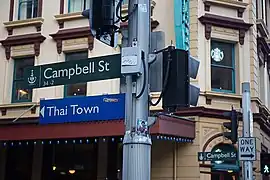Thai Town, Sydney
Thai Town (Thai: ไทยทาวน์ซิดนีย์) is a neighbourhood in Sydney central business district in Australia with a high concentration of Thai retail outlets. It is located in Haymarket on Campbell Street, to the east of George Street, close to Central railway station. It is the second largest of its kind in the world to Thai Town, Los Angeles.[1] As of 2007, Sydney had the highest population of Thais in Australia, with a growing population of around 100,000.[2] Around 17.5 per cent of people who live in the suburb of Haymarket were born in Thailand, according to the 2021 Australian census.[1] Thai Town contains many Thai restaurants, video stores, grocery stores, salons and other businesses.[2]
| Thai Town Sydney, New South Wales | |||||||||||||||
|---|---|---|---|---|---|---|---|---|---|---|---|---|---|---|---|
 Thai Town street marker in 2015 | |||||||||||||||
| LGA(s) | City of Sydney | ||||||||||||||
| State electorate(s) | Sydney | ||||||||||||||
| Federal division(s) | Sydney | ||||||||||||||
| |||||||||||||||
Thai Town was established in the 1990s when rent was relatively affordable, and because it provided a source for Thai speciality foods, many Thai businesses moved into the area. In 2013, the area was officially recognised by the City of Sydney and given signage to indicate the hub's location on Campbell Street.[1]
Chinatown, created in 1980, and Koreatown are adjacent to Thai Town.[2][3]
.jpg.webp)
History
Pontip Walpolehad arived in Australia from Thailand in 1974, and after a stay in Denmark, spent her time in Coffs Habour in 1977 before moving to Sydney. In Sydney, she began supplying Thai ingredients to most of Sydney's Thai restraunts before establishing a Thai grocery store called 'Pontop' in modern-day Thai Town in 1991. She would go on to sell the store in 2012 before dying on 6 March 2020.[4] The Australian Broadcasting Corporation describes Pontip's store as the unofficial 'foundation stone of the city's Thai Town'. In the 1990s, several more Thai restraunts opened around Pontip, also drawn by the area's relatively cheap rent.[1]
In 2013, the area was officially recognised by the City of Sydney and given signage to indicate the hub's location on Campbell Street.[1]
Following the COVID-19 pandemic in 2023, the City of Sydney announced funding of $44 million to the Haymarket area, with some of funding going to Thai Town. The funding is to allow local businesses in the area to celebrate their cultural heritage.[5]
Culture
Most of Thai Town's groceries sell Thai newspapers and magazines, including the Bangkok Post. Natui TV is a Thai news website established by Amy Chanta in Thai Town.[6] The website is designed for Thais moving to or in Australia.[7]
The Thai Consulate in Sydney organises annual concerts performed by Thai singers; while bars and pubs around Thai Town sometime features Thai rock and pop music.[6]
Many Thai festivals, such as the Songkran Festival (Thai New Year) held every April, are celebrated in Thai Town.[2]
References
- Bowring, Declan (2 September 2023). "Ten years after formal recognition, Sydney's Thai Town is getting a long-awaited funding boost". ABC Australia. Retrieved 6 September 2023.
- "Pai Nai Ma :: Thai-Australian Experiences". NSW Migration Heritage Centre. 2007. Archived from the original on 23 June 2014. Retrieved 29 September 2010.
- "The rise of Korea Town and Thai Town". Sydney Morning Herald. 15 March 2011. Retrieved 21 September 2021.
- "Vale Pontip Walpole, Sydney's queen of all things Thai". Good Food. 14 March 2022. Retrieved 24 October 2023.
- Gorrey, Megan (13 August 2023). "The $44m plan to revive Sydney's Haymarket into a food and cultural hotspot". The Sydney Morning Herald. Retrieved 24 October 2023.
- Limited, Bangkok Post Public Company. "The thais that bind on streets of sydney". Bangkok Post. Retrieved 24 October 2023.
- "Home - natui.com.au". www.natui.com.au. Retrieved 24 October 2023.